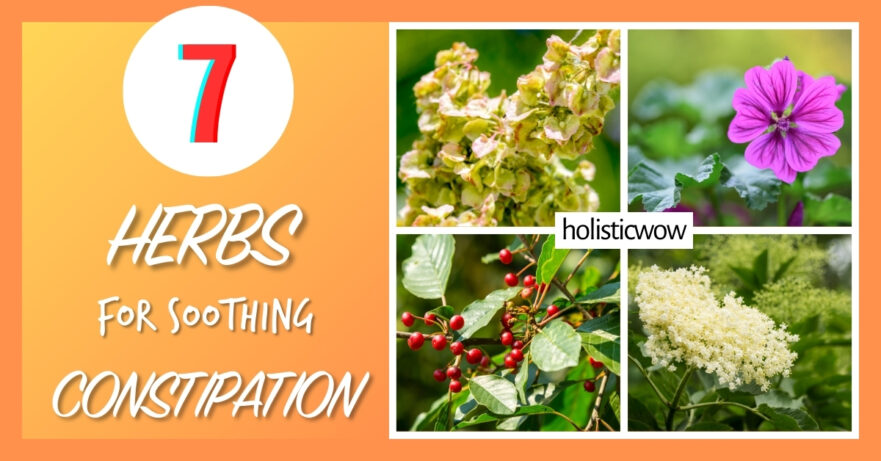In this article about herbs for constipation:
🌿 Gentle Herbs for Effective Constipation Relief | 📜 Herbal Teas for Natural Constipation Relief | ☯️ Integrating Herbs into Daily Life | 🌱 Navigating Herbs Safely
Constipation is a widespread issue that disrupts daily comfort and wellness, often resulting from poor dietary habits, insufficient hydration, and a lack of physical activity. This article examines traditional herbs known for their gentle effectiveness in alleviating constipation.
We will explore how herbs such as elderflower, common mallow, dandelion root, and others enhance digestive regularity and integrate seamlessly into daily health routines to improve overall digestive health.
These natural remedies provide a holistic approach to managing digestive issues, offering a soothing alternative to over-the-counter medications.
By understanding the properties and benefits of these herbs, you can make informed choices about incorporating them into your healthcare regimen to support long-term digestive wellness.
Key Takeaways
- 🌿 Holistic herbal relief: Elderflower, common mallow, and senna are among the herbs that offer a natural, effective way to alleviate constipation. Each has unique properties that enhance digestive regularity and health.
- 🕒 Integration into daily routines: Incorporating these herbs through teas, capsules, or dietary adjustments not only aids in maintaining regular bowel movements but also supports overall digestive wellness.
- 💡 Supportive lifestyle changes: Complementing herbal treatments with a balanced diet rich in fiber, adequate hydration, and regular exercise maximizes the effectiveness of these natural remedies, promoting long-term digestive health and well-being.
🌿 Gentle Herbs for Effective Constipation Relief
Constipation is a common yet uncomfortable condition characterized by infrequent or difficult bowel movements. Poor diet, inadequate hydration, and lack of physical activity can contribute to this digestive challenge, affecting overall quality of life.
Among the various treatment options, specific herbs such as elderflower, common mallow, dandelion root, slippery elm, yellow dock, alder buckthorn, and senna have proven to be effective.
These herbs, valued for centuries for their effectiveness in enhancing digestive health and promoting regular bowel movements, offer natural relief with fewer side effects than conventional medications.
Integrating these natural remedies into your healthcare routine can lead to sustained improvements, helping to restore the natural rhythm and health of your digestive system. These herbs, known for their gentle yet effective action, provide a safe and comfortable approach to managing constipation.
Elderflower
Elderflower is not just a delicate flower with a pleasant aroma; it plays a subtle yet supportive role in managing digestive health. While not a direct laxative, elderflower promotes a balanced digestive system, making it a soothing addition to any herbal tea blend to enhance gut health. Elderflower can also help reduce mild inflammation in the digestive tract, offering a gentle way to alleviate symptoms associated with digestive discomfort. Its pleasant taste makes it a favorite among herbal tea lovers, blending well with other herbs to improve overall wellness.
Common mallow
Common mallow, a pretty plant with a gentle touch, is a digestive soother rich in mucilage. This natural remedy gently coats and lubricates the intestines, easing the passage of stools. It’s an excellent choice for those seeking a mild, natural remedy for mild constipation. Common mallow is particularly beneficial for individuals with sensitive stomachs, as it helps soothe irritation and inflammation in the digestive tract. Its mild soothing effect can be a blessing for those looking to avoid harsher over-the-counter laxatives.
Slippery elm
Slippery elm, with its rich mucilage content, acts as a natural soother for the digestive tract, coating the stomach and intestines to facilitate easier bowel movements. This herb benefits those with sensitive systems, providing relief without irritation. Also, slippery elm can help support healing in the gastrointestinal tract, which is beneficial for those suffering from gastritis or acid reflux. Herbalists often recommend it for its soothing and healing properties, making it a cornerstone in natural gastrointestinal therapy.
Yellow dock
Yellow dock goes beyond mere digestive support. Its root stimulates bile production, including compounds with mild laxative effects to promote digestive regularity. Yellow dock can be an integral part of a dietary approach to managing constipation, and it is used in teas or supplements. This herb also acts as a blood purifier and can help improve iron absorption, making it particularly useful for those with anemia. Regular use of yellow dock can enhance liver function and aid in the body’s natural detoxification processes.
Alder buckthorn (Frangula)
Alder buckthorn (Frangula) has been valued for centuries for its effective and considerate laxative properties. Perfect for more stubborn cases of constipation, it works efficiently to cleanse the bowel, yet it’s gentle enough to avoid the discomfort often associated with stronger laxatives. Alder buckthorn is also known for promoting the health of the gastrointestinal tract by ensuring smooth muscle function, which is crucial for maintaining good bowel habits. Using this herb under supervision is recommended as part of a balanced approach to digestive health.
Senna
Senna is among the most potent herbal laxatives, known for its effectiveness in quickly clearing constipation. While incredibly effective, it should be used judiciously to prevent dependency. It is typically reserved for acute situations where immediate relief is necessary. Senna acts rapidly, usually producing a bowel movement within six to twelve hours, making it an excellent option for occasional use. However, it’s important to combine it with plenty of water and dietary fiber to support overall digestive health.
Dandelion root
Dandelion root is a robust herb known for its liver-supporting and digestive benefits. It stimulates bile production, which not only enhances digestion but also helps to soften stools naturally. Incorporating dandelion root into your diet can support regular bowel movements, integrating smoothly into your wellness routine with teas or as a cooked green. Dandelion is also loaded with vitamins and minerals, boosting overall health and aiding digestive processes. It’s a natural detoxifier, helping cleanse the liver and improve bile flow, which is essential for proper digestion.
Herbal remedies offer a natural, effective approach to managing constipation. Compared to traditional medications, they provide relief with a lower risk of side effects. Incorporating these herbs into your daily routine through teas, capsules, or dietary adjustments can improve your digestive health and achieve more regular bowel movements.
As beneficial as these herbs are, they work best as part of a comprehensive health strategy that includes a balanced diet, sufficient water intake, and regular physical activity to optimize overall well-being.
📜 Herbal Teas for Natural Constipation Relief
Constipation can significantly hinder daily comfort and health, creating a pressing need for effective and gentle solutions. Many traditional herbal blends combine natural remedies known for their digestive benefits. These combinations often include herbs such as dried elderflower, slippery elm, and yellow dock, each selected for their unique properties supporting digestive health and easing constipation.
Using these herbal blends offers a natural alternative to over-the-counter medications, potentially reducing the likelihood of side effects and promoting overall wellness through the wisdom of herbal medicine.
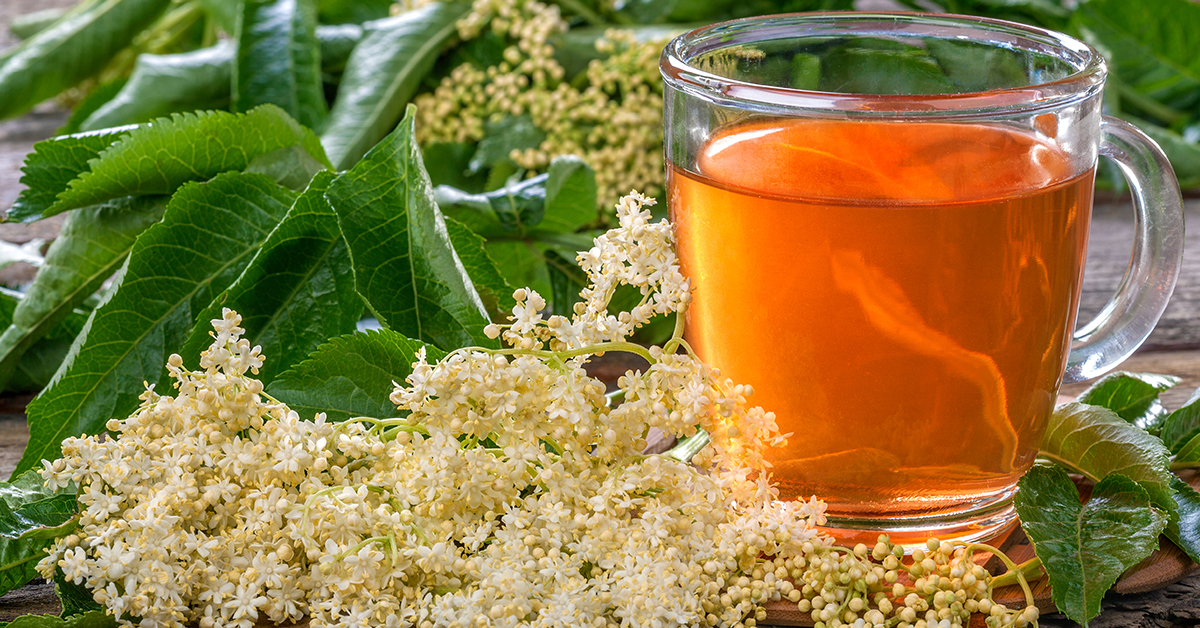
Digestive Health Blend
Ingredients:
- ½ teaspoon dried elderflower,
- ½ teaspoon dried dandelion root,
- 1 cup of boiling water
Preparation:
- Combine dried elderflower and dried dandelion root in a teapot.
- Pour boiling water over the herbs and steep for 10 minutes.
- Strain and drink two times daily to support digestive health and promote bile flow.
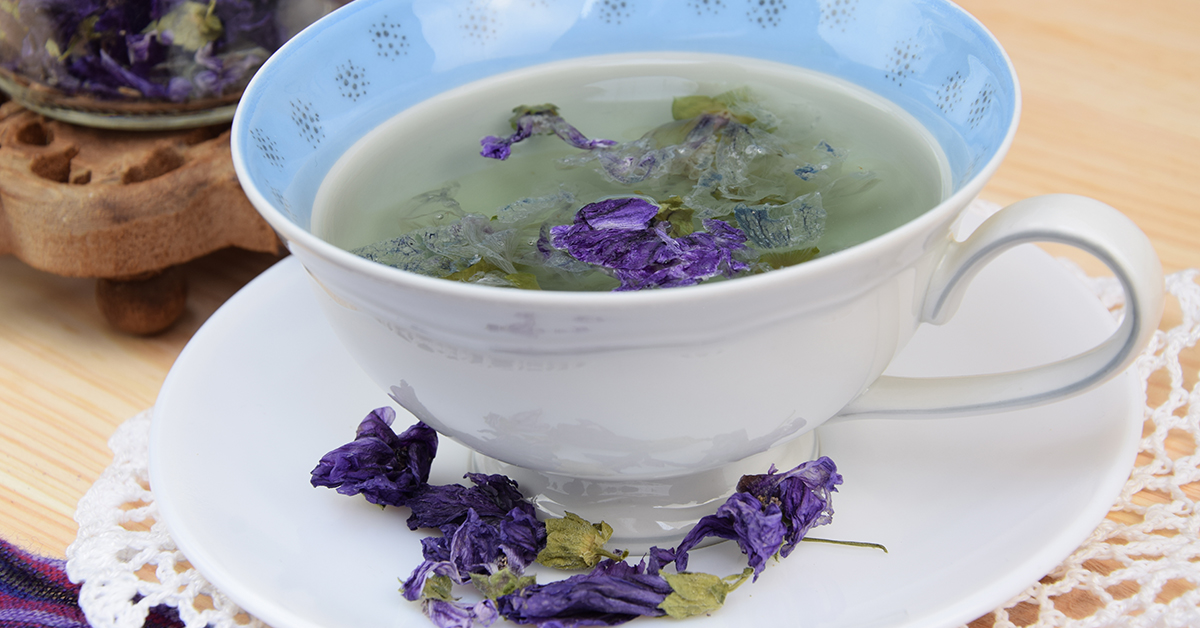
Gentle Constipation Relief Tea
Ingredients:
- ½ teaspoon dried common mallow,
- ½ teaspoon dried yellow dock root,
- 1 cup of boiling water.
Preparation:
- Mix dried common mallow and yellow dock root in a pot.
- Add boiling water and steep for 10-15 minutes.
- Strain and drink once daily to gently relieve constipation.
Due to its oxalate content, yellow dock should be used with caution in those with a history of kidney stones.
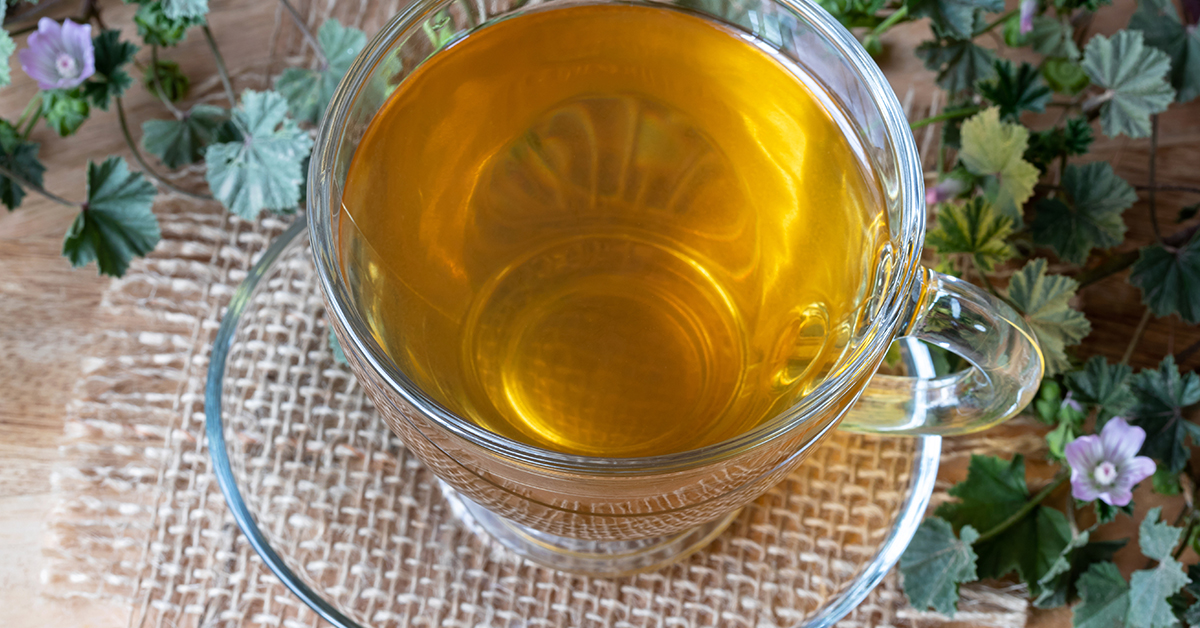
Balancing Digestive Tea
Ingredients:
- ¼ teaspoon dried yellow dock,
- ½ teaspoon dried common mallow,
- ¼ teaspoon dried slippery elm,
- 1 liter of boiling water.
Preparation:
- Combine all dried herbs in a pot with boiling water.
- Simmer for 20 minutes.
- Strain the tea.
Drink twice daily to promote regular bowel movements and soothe the digestive system
Slippery elm should be used with caution if taking other medications, as it can interfere with their absorption.
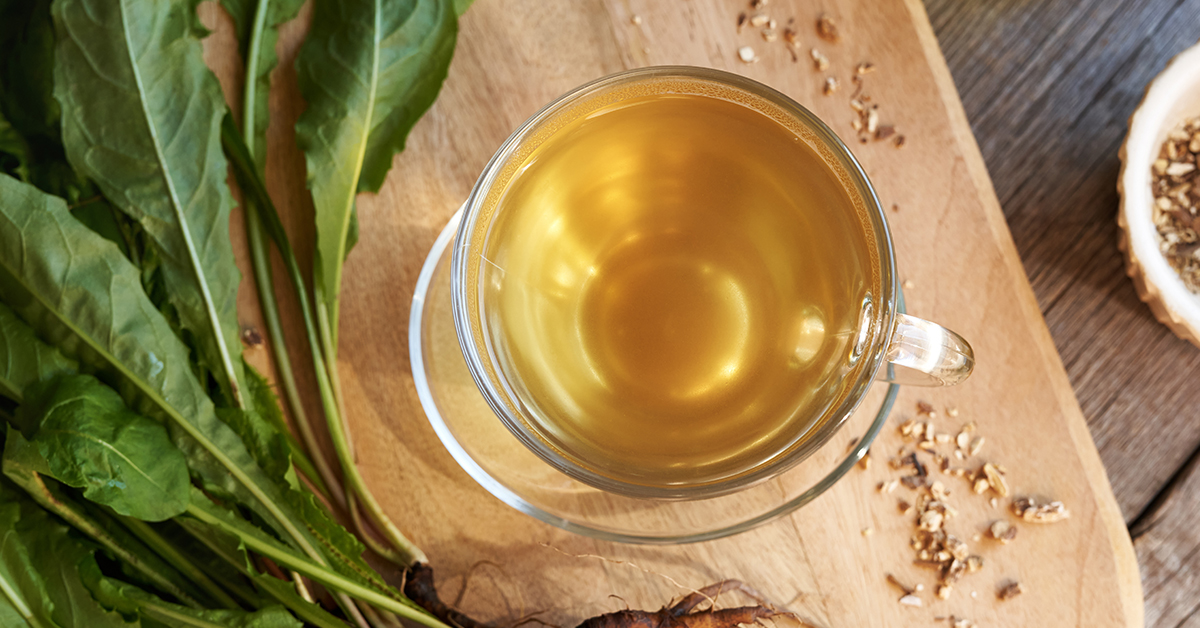
Comprehensive Digestive Support Tea
Ingredients:
- ¼ teaspoon dried slippery elm,
- ½ teaspoon dried elderflower,
- ½ teaspoon dried dandelion root,
- 1 cup of boiling water.
Preparation:
- Boil all dried ingredients together for 15 minutes.
- Strain and drink twice daily to coat and soothe the digestive tract and enhance liver function.
Dandelion root should be used with caution by those with gallbladder disease.
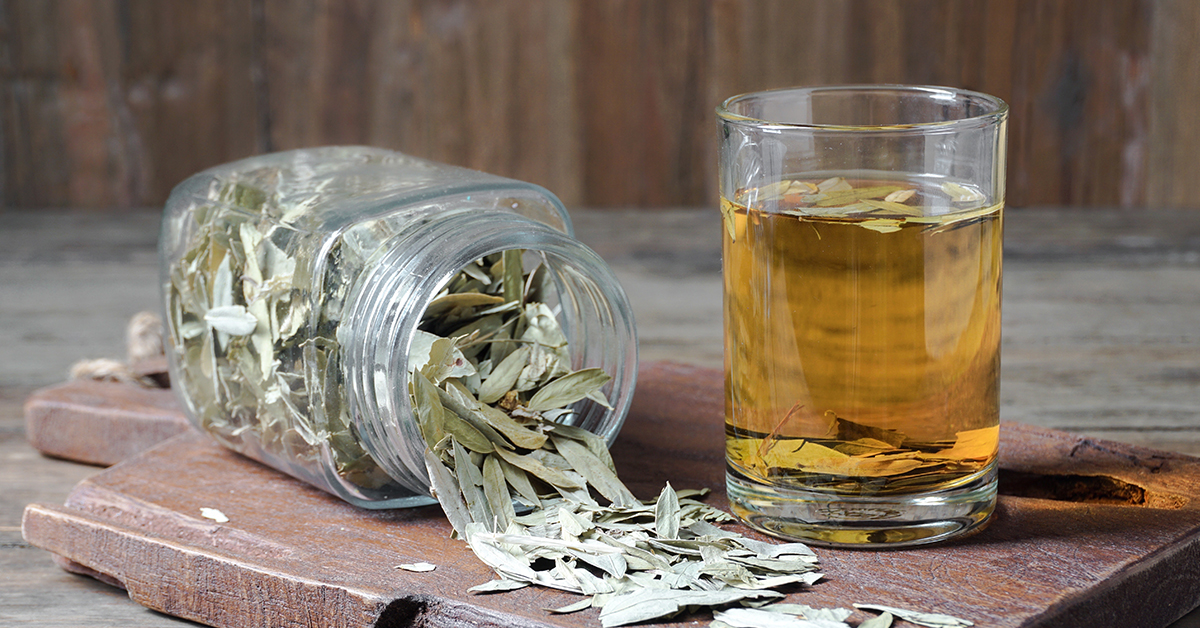
Herbal Laxative Mixture
Ingredients:
- ¼ teaspoon dried senna,
- ¼ teaspoon dried alder buckthorn bark,
- 1 cup of boiling water.
Preparation:
- Add dried senna and alder buckthorn to a pot of boiling water.
- Let steep for 10 minutes, then strain.
Drink a small cup at bedtime as needed for acute constipation relief.
It is not for daily use; limit it to 2-3 times per week to avoid dependency. Senna and alder buckthorn should not be used by pregnant or breastfeeding women without medical supervision.
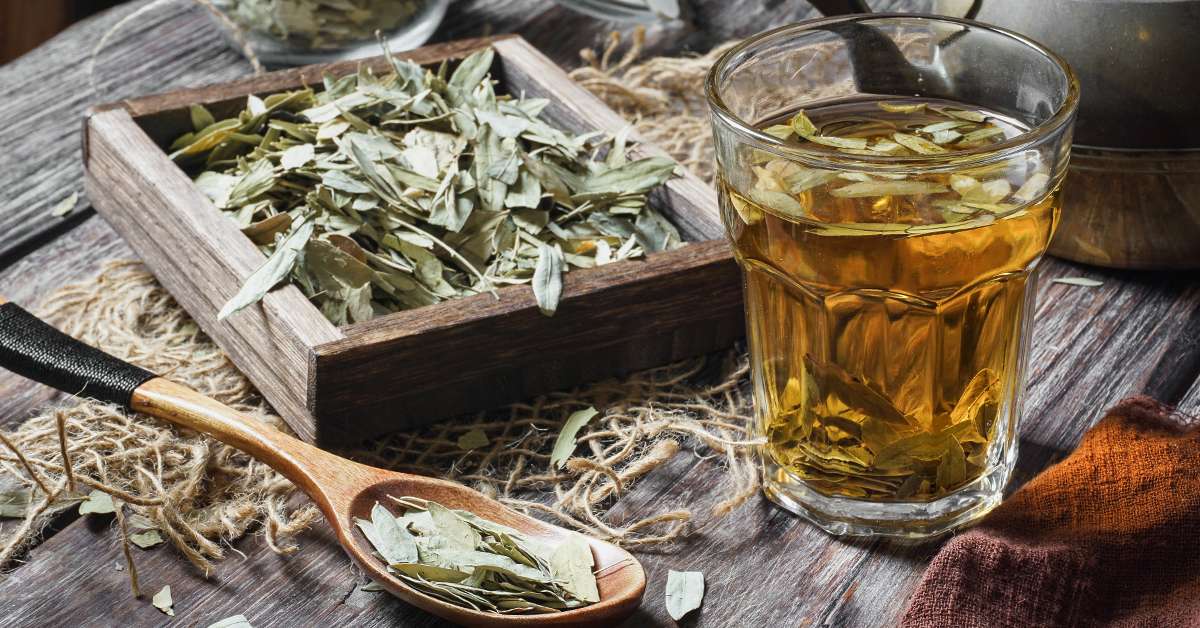
Senna Night Relief Tea
Ingredients:
- 1 teaspoon dried senna leaves,
- 1 cup of boiling water.
Preparation:
- Soak the dried senna leaves in boiling water for 6-12 hours.
- Strain and drink the infusion before bedtime.
Use sparingly to avoid dependency, ideally not more than twice a week. Senna should not be used by individuals with intestinal obstruction, ulcerative colitis, Crohn’s disease, or severe dehydration.
These herbal tea recipes provide a natural and supportive approach to managing constipation, each tailored to different needs and severity levels. They combine the therapeutic properties of well-known digestive herbs, offering relief that aligns with a lifestyle focused on natural health.
These teas work best when integrated into a balanced diet rich in fiber, adequate hydration, and regular exercise. For optimal results and safety, consult a healthcare provider before beginning any new herbal regimen, especially if you are pregnant, breastfeeding, or managing chronic health conditions.
☯️ Integrating Herbs into Daily Life to Improve Bowel Regularity
Incorporating specific herbs into your daily routine can offer gentle and effective solutions for managing constipation and enhancing digestive wellness.
Here are practical tips for using herbs such as elderflower, common mallow, dandelion root, slippery elm, yellow dock, alder buckthorn, and senna, along with complementary practices to maximize their benefits.
Daily Use and Lifestyle Integration
- 🫖 Herbal teas: Begin your day with a cup of Digestive Health Blend to stimulate bile flow and enhance digestion. Post-meal, consider the Gentle Constipation Relief Tea to support regular bowel movements. Before bedtime, a cup of Senna Night Relief Tea can effectively relieve occasional constipation. Start with small amounts to see how your body responds, and increase gradually as needed.
- 🔬 Herbal capsules and supplements: If brewing tea daily is challenging, consider capsules containing herbal extracts like senna or dandelion root, which can be taken with water. Follow the dosage recommendations on the packaging or a healthcare provider’s advice.
Dietary Integration and Fiber Intake
- 🥦 Incorporating fiber-rich foods into meals: Enhance your dietary fiber intake by adding psyllium husk or ground linseeds to your meals. These can be blended into smoothies, stirred into yogurt, or sprinkled over oatmeal. Additionally, include dried plums in your diet, known for their natural laxative properties and can be chopped into cereals and salads to help stimulate bowel movements.
- 🍽️ Dietary adjustments Include high-fiber foods such as fruits, vegetables, and whole grains to help soften stool and ease its passage. Limiting the intake of processed foods and red meats can also improve digestive health.
Additional Practices to Support Digestive Health
- 💧 Stay hydrated: Drinking adequate water is crucial, especially when increasing fiber intake, to help prevent constipation. Aim for at least 8-10 glasses of water a day.
- 🏃♂️ Physical activity: Regular exercise like walking, yoga, or swimming can stimulate the natural contraction of intestinal muscles, helping to move stools more efficiently.
- 🕒 Routine: Establishing a regular toileting routine can encourage more consistent bowel movements. Attempting to go at the same time each day, particularly after meals, can help train your digestive system.
Integrating these herbal remedies and lifestyle changes into your daily routine offers a holistic approach to managing constipation.
It’s important to consult a healthcare provider for persistent symptoms or before starting any new supplement, especially if you have underlying health conditions. These strategies are meant to complement, not replace, professional medical advice.
🌱 Navigating Herbs Safely
Starting with small doses is the first step when adding herbal remedies to your health routine.
This approach lets you see how you respond and adjust amounts for the best effect, keeping safety in mind. While many herbs are safe, everyone’s body reacts differently. If you notice any side effects, it’s important to stop and think about what might be causing them.
Remember, herbs can sometimes interact with prescription medicines. These interactions might make your medicines work too well or not well enough, which is why talking to a healthcare provider or an herbalist is essential. This is especially crucial if you’re pregnant, breastfeeding, taking medications regularly, or have an existing health condition. Getting advice tailored to your situation can help you avoid any unnecessary risks.
For kids and older adults, being extra careful with herbs is important. Their bodies might react more strongly to herbal remedies, and the chance of side effects or interactions could be greater. Before giving herbal treatments to children or elderly family members, getting advice from a professional is a must to ensure their safety.
By being cautious and seeking expert advice when needed, you can make herbal remedies a safe part of your wellness plan. This careful approach allows you to enjoy the benefits of herbs while keeping yourself and your family safe.
These herbs are not only effective but also offer a safer alternative to over-the-counter medications, minimizing the risk of side effects. Incorporating these herbs through teas, capsules, or dietary adjustments can enhance your digestive system’s health and promote regular bowel movements.
Remember, while these herbal remedies can significantly improve constipation, they should be part of a broader health strategy that includes a balanced diet, adequate hydration, and regular physical activity to achieve the best results. Consultation with a healthcare provider is recommended to tailor these suggestions to your health needs and conditions.
FAQ
How often can I safely use herbal teas for constipation?
Herbal teas for constipation, such as those containing senna or alder buckthorn, should be used with caution. Senna, for example, is effective but should not be used continuously for more than a week without consulting a healthcare provider. This is to avoid dependency and potential complications. You can consume the tea daily for gentler herbs like dandelion root or elderflower. Always start with smaller amounts to see how your body reacts, and consult with a healthcare provider to ensure it's safe for you, especially if you have underlying health conditions.
Are there any herbs for constipation that are safe for children and pregnant women?
For children and pregnant women, it's crucial to consult a healthcare provider before using any herbs for constipation. Many herbs, such as senna and alder buckthorn, are not recommended for children or during pregnancy due to their strong laxative effects and potential to cause harm. Milder herbs like dandelion root, elderflower, psyllium, and linseed are generally safer but should still be used under medical supervision to ensure they do not interfere with other health conditions or medications.
What are the best practices for incorporating herbal remedies into a constipation management plan?
The best practices for incorporating herbal remedies into a constipation management plan include using them as part of a broader health strategy. This includes maintaining a balanced diet rich in fiber, staying well-hydrated, and getting regular physical activity to enhance the effectiveness of the herbs. Start with mild herbs and teas and consider their frequency and dosage based on your individual health needs. It's also important to pay attention to how your body responds to these herbs and to consult a healthcare provider to adjust the approach as needed, especially if symptoms persist or worsen.

